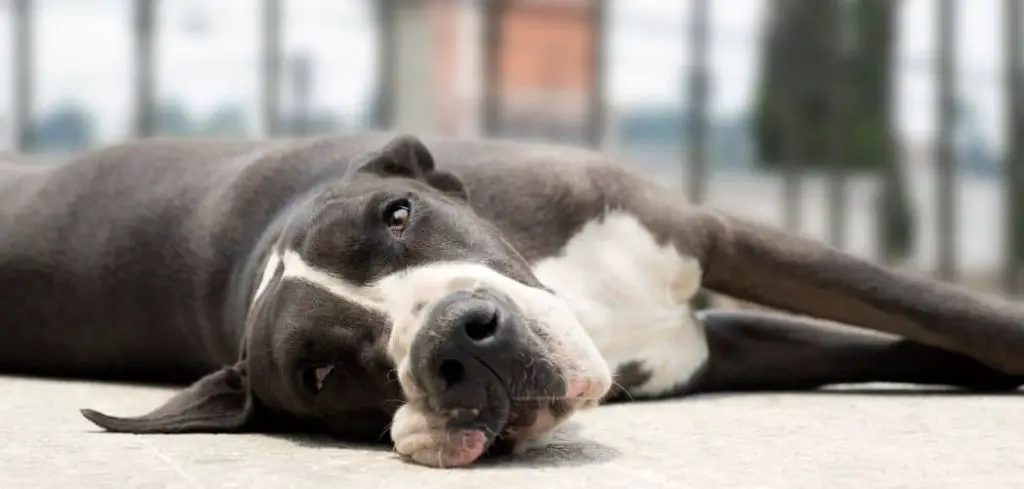When your dog isn’t eating and also hasn’t pooped, it’s a clear signal that something’s off with their digestive system. This combination of symptoms can indicate anything from mild constipation to a life-threatening blockage.
We outline the common causes of a dog not pooping and not eating, what you can do at home, and when to seek veterinary help.
Dog Not Pooping and Not Eating — Why It Happens
A dog that won’t eat and hasn’t had a bowel movement may be experiencing a slowdown or obstruction in their gastrointestinal (GI) tract. This could be due to constipation, ingestion of a foreign object, dehydration, or other illnesses affecting digestion.
Dogs with abdominal discomfort often lose their appetite. In some cases, this pairing of symptoms could point to a serious condition like an intestinal blockage, especially if vomiting or lethargy is also present.

Common Causes of Dog Not Pooping and Not Eating
Constipation
Constipation is a common reason for both appetite loss and lack of bowel movements. If your dog’s stools are hard or dry—or they’re straining without success—constipation may be to blame.
It can result from dehydration, lack of dietary fiber, insufficient exercise, or a sedentary lifestyle. Painful defecation may cause your dog to avoid eating altogether.
Chronic constipation can lead to a condition called megacolon, which causes further loss of appetite and discomfort.
Intestinal Blockage
Foreign objects like toys, bones, or fabric can become lodged in the intestines, causing a blockage.
Dogs with intestinal obstruction often stop eating, and they may not poop for several days.
This condition is serious and potentially fatal if not treated promptly. Other signs may include vomiting, abdominal bloating, whining, or restlessness.
Blockages prevent food and waste from moving normally, leading to a full shutdown of the GI tract.
Read more: Dog Not Drinking Water and Not Eating (When to worry)
Dehydration
Dehydration slows down the digestive process, making bowel movements less frequent and suppressing hunger. Dogs may become dehydrated due to hot weather, illness, or inadequate water intake.
A dry mouth, tacky gums, and lethargy are other red flags to watch for.
In more severe cases, dehydration can exacerbate constipation and increase the risk of more severe GI problems.
Anal Gland Issues
Dogs with impacted or infected anal glands may avoid defecating due to pain. This discomfort can also reduce their appetite.
You may notice your dog scooting, licking the area excessively, or showing signs of discomfort when trying to poop.
Left untreated, anal gland infections can turn into abscesses or more systemic infections, further affecting appetite and activity.
Stress or Anxiety
Sudden routine changes, new environments, or household disruptions can trigger stress-related digestive changes in dogs. Some dogs respond by holding in their stool or refusing to eat.
This behavior can be especially common after moving, traveling, or being boarded. Stress may also trigger mild gastrointestinal upset or constipation.
Short-term stress is often self-resolving, but prolonged issues may need behavioral support or treatment.
Gastrointestinal Disease
Diseases like colitis, inflammatory bowel disease (IBD), or intestinal infections can disrupt digestion and appetite. In some cases, they cause both vomiting and diarrhea, while in others, they slow things down completely.
A dog with a GI condition may refuse to eat and go days without pooping, especially during a flare-up.
Testing and long-term management may be necessary if a chronic digestive disorder is diagnosed.
What to Do If Your Dog Is Not Pooping and Not Eating
If your dog hasn’t pooped in over 48 hours and isn’t eating, try to monitor closely for additional symptoms like vomiting, lethargy, or abdominal swelling.
Make sure your dog has easy access to clean, fresh water and encourage light exercise, like a short walk, which may stimulate their bowels.
Feeding a small amount of canned pumpkin (plain, not spiced) can help relieve mild constipation due to its high fiber content.
Avoid giving human laxatives or over-the-counter medications without veterinary guidance, as these can be harmful.
If your dog appears otherwise normal and starts eating again, they may have just had a temporary slow-down. However, persistent symptoms require further evaluation.
When to Call or Visit Your Vet
You should contact your vet immediately if:
Your dog hasn’t pooped in more than 48 hours and still refuses food
They are vomiting or appear bloated
You suspect they may have eaten something inedible
They’re lethargic, shaking, or showing signs of pain
There is blood in their stool or vomit
A veterinary exam may include x-rays, blood work, or even an ultrasound to check for obstructions, dehydration, or other underlying illnesses.
Prompt treatment is critical, especially for blockages, as delays can be fatal.
Read more: Dog Not Active and Not Eating (How to help)
Key Takeaway
When your dog isn’t pooping and isn’t eating, it’s often a signal of an underlying digestive issue that needs attention. While mild constipation or stress may resolve on its own, a blockage or serious illness needs prompt veterinary care.
Keep a close eye on your dog’s symptoms and don’t wait too long to seek help. With timely support, most dogs can return to normal digestion and appetite safely.
